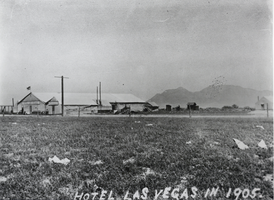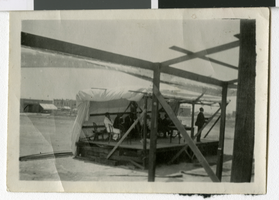Search the Special Collections and Archives Portal
Search Results
Patricia Brinton, Margaret Carnell, and Sharon Schmitt oral history interview
Identifier
Abstract
Oral history interview with Patricia Brinton, Margaret Carnell, and Sharon Von Tobel Schmitt conducted by Lois Goodall on April 30, 2014 for the Boyer Early Las Vegas Oral History Project. In this interview Brinton, Carnell, and Schmitt discuss their grandparents, Ed Von Tobel Sr. and Mary Hameril. They also discuss their own parents, growing up in Las Vegas, Nevada, the Von Tobel lumberyard, Helldorado Days, and how Las Vegas has grown.
Archival Collection
Roosevelt Toston oral history interview
Identifier
Abstract
Oral history interview with Roosevelt Toston conducted by Claytee D. White on July 11, 2006 for the Boyer Early Las Vegas Oral History Project. Toston discusses moving to Las Vegas, Nevada in the 1950s and his various careers at the Test Site, Bell Telephone of Nevada, as a television anchorman and cameraman, and the Convention and Visitors Authority to bring conventions to Las Vegas. He also talks about ways African American entrepreneurs might get involved in the convention business.
Archival Collection
Irving Kirshbaum oral history interview
Identifier
Abstract
Oral history interview with Irving Kirshbaum conducted by Cheryl Rogers on February 23, 1979 for the Ralph Roske Oral History Project on Early Las Vegas. In this interview, Kirshbaum discusses the Riviera Hotel where he began working in 1955. He also talks about the landscape of the Las Vegas Strip in the 1950s, and the state of gambling, comps, customer service, and dealer training. Kirshabum discusses the treatment of minorities at the Riviera and in Las Vegas, Nevada generally.
Archival Collection
Rosa Lee Brewer, Maxine Westby, and Angelia Carter oral history interview
Identifier
Abstract
Oral history interview with Rosa Lee Brewer, Maxine Westby, and Angelia Carter conducted by Claytee D. White on April 17, 2019 for the Boyer Early Las Vegas Oral History Project. In this interview, Brewer discusses her early life in Birmingham, Alabama and moving to Las Vegas, Nevada in 1957. Brewer and Westby remember living in the Westside, J Street and Jackson Street businesses, and the issue of homelessness in that area. Later, Brewer, Westby, and Carter discuss the schools on the Westside and school integration. Lastly, Brewer, Westby, and Carter discuss changes in the Westside.
Archival Collection
Manley Sorensen oral history interview
Identifier
Abstract
Oral history interview with Manley Sorensen conducted by Michael Kelser on March 02, 1977 for the Ralph Roske Oral History Project on Early Las Vegas. In this interview, Sorensen discusses the history of Las Vegas, Nevada. Sorensen discusses how Las Vegas has changed since 1936, including how the casinos in the city have changed and the disappearance of water springs around Las Vegas. Sorensen also discusses the El Rancho Hotel fire, prospecting for recreation, environmental changes, nuclear weapons tests, and flooding in Las Vegas.
Archival Collection
Donna and Tom Martin oral history interview
Identifier
Abstract
Oral history interview with Donna and Tom Martin conducted by Claytee D. White on January 31, 2013 for the Boyer Early Las Vegas Oral History Project. The Martins discuss moving to Las Vegas, Nevada in the early 1950s as each of their parents sought new opportunities and graduating from Rancho High School in 1962. Donna Martin then discusses her career as a secretary and her volunteer work as part of a woman's group she belongs to. Tom Martin discusses working in the office of a steel company, and later running a tire store.
Archival Collection
Lovey McCurdy oral history interview
Identifier
Abstract
Oral history interview with Lovey McCurdy conducted by Greg McCurdy on March 19, 1981 for the Ralph Roske Oral History Project on Early Las Vegas. Lovey recalls arriving in Las Vegas, Nevada in 1951, meeting white people in Las Vegas, Nevada, the atomic bomb testing, and other aspects of being part of the African American community during the 1950s and 1960s.
Archival Collection
Frank Fahrenkopf oral history interview
Identifier
Abstract
Oral history interview with Frank Fahrenkopf conducted by Tony Batt on October 14 through 21, 2024 for the Boyer Early Las Vegas Oral History Project. In this interview, Fahrenkopf begins by recalling his childhood in New York and later moving to Nevada with his father and sister. Following graduation from the University of Nevada, Reno, Fahrenkopf earned a law degree from the University of California in Berkeley. Fahrenkopf details his career as a lawyer, being chairman of the Nevada Republican Party, and his close relationship with Paul Laxalt, and his appointment as chairman of the Republican National Committee in 1983 by Laxalt’s best friend, President Ronald Reagan. He also details how he created the American Gaming Association.
Archival Collection

Photograph of Hotel Las Vegas, Las Vegas, 1905
Date
Archival Collection
Description
Image

Photograph of Judge Henry M. Lillis in Las Vegas, Nevada, July 4, 1907
Date
Archival Collection
Description
Image
